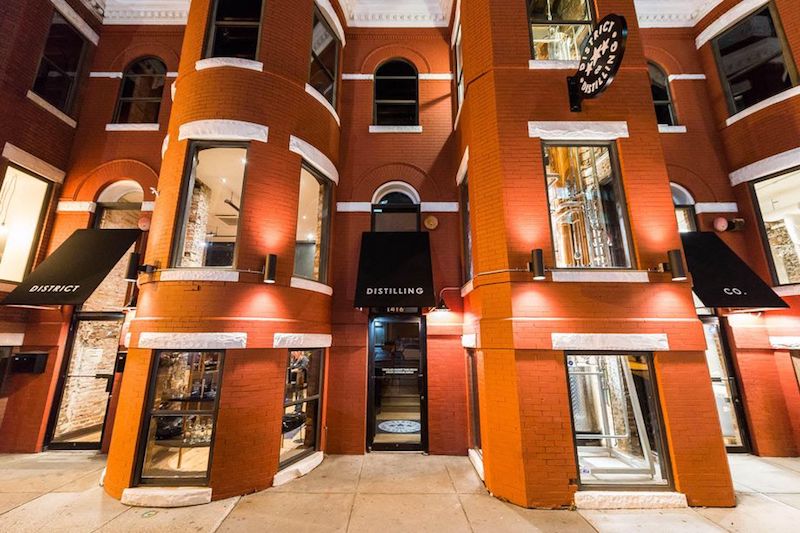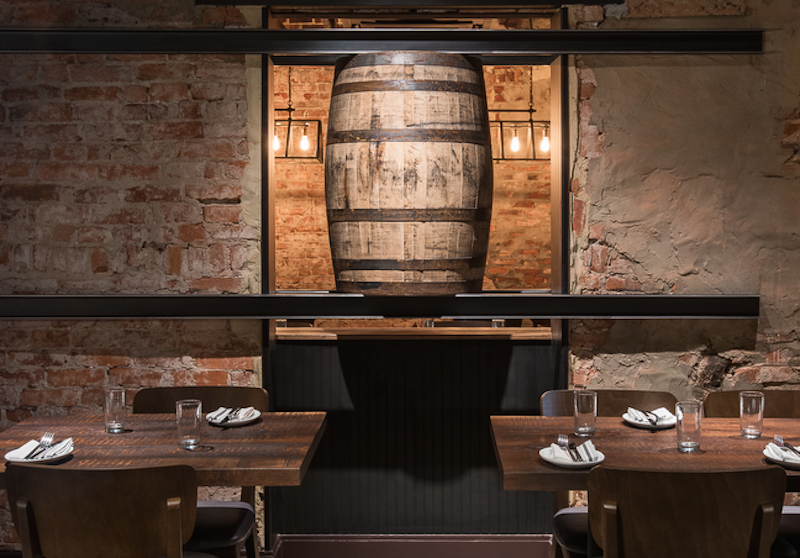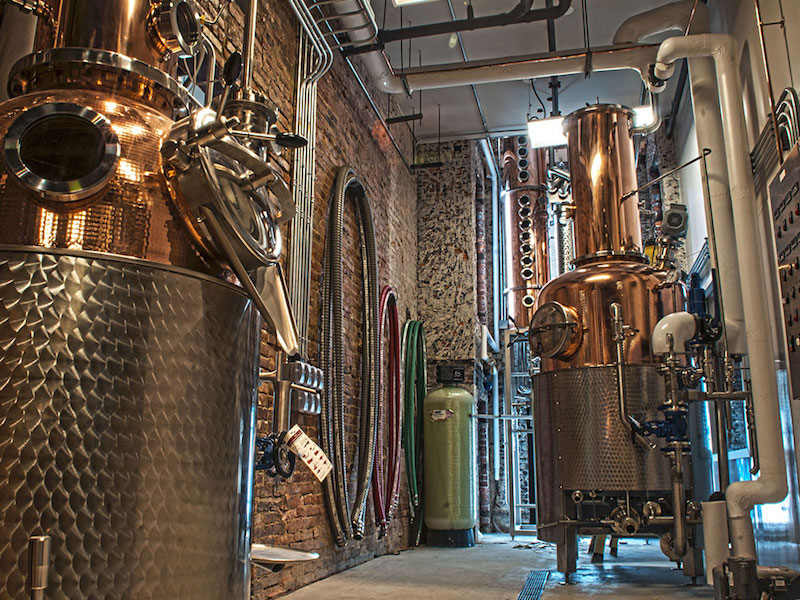Last August, District Distilling, Washington D.C.’s first combination distillery-kitchen-bar, opened with much fanfare inside a 19th Century row house along historic 14th Street. A 2014 law change now permits local distilleries to pour spirits they make onsite.
Since that opening, the location’s designer, GrizForm Design Architects, has been tweaking the lighting for the ground floor distillery that unexpectedly has become a tourist attraction and also accommodates parties.
The distillery features two copper pot stills and a 38-plate twin copper column system. “The stills are quite beautiful, with copper and stainless steel accents,” says Griz Dwight, who owns the design firm. So throughout District Distilling, he tried to sustain that visual by combining, wherever possible, two types of materials, such as copper and wood, leather and steel, light and mirrors.
District Distilling Co., the four-year-old owner of the restaurant, was instrumental in getting the distillery law changed, says Dwight. It was also hands-on during the project, whose Building Team included Potomac Construction (GM), Allen & Shariff (MEP), Structura (SE), and Hospitality Kitchen Design (food service).
Carl, the Germany-based company that supplied the distilling equipment, didn’t have a representative on site, so the team had to figure out how to assemble the stills, the larger of which are 2½ stories tall and prominently visible throughout the building. The stills—which distill gin, vodka, rum, and whiskey—have portals and interior lights so patrons can look in and watch the process. (Reserved tours at $10 per person.)

District Distilling converted three row houses that had been restaurants into a two-floor distillery and restaurant that includes ground-floor retail. Image: Eater/R. Lopez
Dwight says the 8,000-sf space is actually 3½ row houses that were once separate restaurants but had been vacant for a while. The team removed walls to open the room, which includes the second-floor, 139-seat restaurant and bar. District Distilling also has a ground floor retail area that sells bottles of the spirits it produces and other merchandise.
The distillery was scheduled to release its first spirit, called Corridor Vodka, this fall, and what it makes will eventually be offered for the cocktails served at the bar and restaurant.
The demand for distilleries that sell their products to the public is undeniable. More than half of the domestic business generated by the 1,280-plus active craft spirits producers in the U.S. is driven by direct sales at a distillery or tasting room, according to the American Craft Spirits Association’s 2016 report.
Dwight says his firm is working on another distillery-restaurant-bar, Farmers & Distillers in Mt. Vernon, Va., that’s scheduled to open December 13, but will lean toward the restaurant and be more of a finishing distiller than District Distilling. The website Eater reports that another combination, Cotton & Reed, is set to open next year near the District’s Union Market.

The 8,000-sf District Distilling is part of a growing trend of distilleries selling directly to the public. Image: District Distrilling Co./Amber Frederiksen
Related Stories
Designers | Oct 1, 2024
Global entertainment design firm WATG acquires SOSH Architects
Entertainment design firm WATG has acquired SOSH Architects, an interior design and planning firm based in Atlantic City, N.J.
Higher Education | Sep 30, 2024
Studio Gang turns tobacco warehouse into the new home of the University of Kentucky’s College of Design
Studio Gang has completed the Gray Design Building, the new home of the University of Kentucky’s College of Design. In partnership with K. Norman Berry Associates Architects, Studio Gang has turned a former tobacco warehouse into a contemporary facility for interdisciplinary learning and collaboration.
Warehouses | Sep 27, 2024
California bill would limit where distribution centers can be built
A bill that passed the California legislature would limit where distribution centers can be located and impose other rules aimed at reducing air pollution and traffic. Assembly Bill 98 would tighten building standards for new warehouses and ban heavy diesel truck traffic next to sensitive sites including homes, schools, parks and nursing homes.
Laboratories | Sep 27, 2024
Traditional lab design doesn't address neurodiverse needs, study finds
A study conducted by ARC, HOK, and the University of the West of Scotland, has revealed that half (48.1%) of all survey respondents who work in laboratory settings identify as neurodivergent.
Laboratories | Sep 26, 2024
BSL conversions: A cost-efficient method to support high-containment research
Some institutions are creating flexible lab spaces that can operate at a BSL-2 and modulate up to a BSL-3 when the need arises. Here are key aspects to consider when accommodating a rapid modulation between BSL-2 and BSL-3 space.
MFPRO+ News | Sep 24, 2024
Major Massachusetts housing law aims to build or save 65,000 multifamily and single-family homes
Massachusetts Gov. Maura Healey recently signed far-reaching legislation to boost housing production and address the high cost of housing in the Bay State. The Affordable Homes Act aims to build or save 65,000 homes through $5.1 billion in spending and 49 policy initiatives.
Designers | Sep 20, 2024
The growing moral responsibility of designing for shade
Elliot Glassman, AIA, NCARB, LEED AP BD+C, CPHD, Building Performance Leader, CannonDesign, makes the argument for architects to consider better shade solutions through these four strategies.
Mixed-Use | Sep 19, 2024
A Toronto development will transform a 32-acre shopping center site into a mixed-use urban neighborhood
Toronto developers Mattamy Homes and QuadReal Property Group have launched The Clove, the first phase in the Cloverdale, a $6 billion multi-tower development. The project will transform Cloverdale Mall, a 32-acre shopping center in Toronto, into a mixed-use urban neighborhood.
Codes and Standards | Sep 19, 2024
Navigating the intricacies of code compliance and authorities having jurisdiction
The construction of a building entails navigating through a maze of regulations, permits, and codes. Architects are more than mere designers; we are stewards of safety and navigators of code compliance.
Higher Education | Sep 18, 2024
Modernizing dental schools: The intersection of design and education
Page's John Smith and Jennifer Amster share the how firm's approach to dental education facilities builds on the success of evidence-based design techniques pioneered in the healthcare built environment.

















